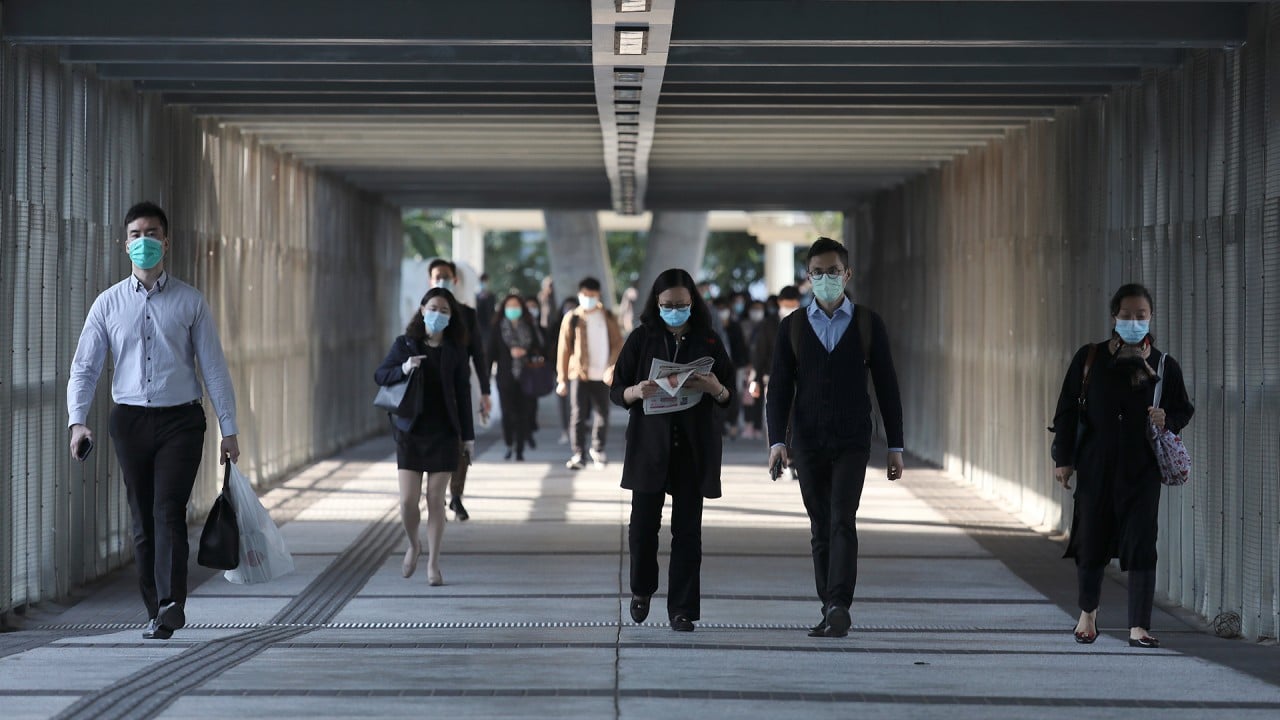
Hong Kong fourth wave: Kwai Chung residents, quarantine staff and Yata workforce among 100 new Covid-19 cases
- Kwai Shing West Estate outbreak expands to 18 cases and is now spread out across five floors
- Several new cases also tied to Sha Tin department store and AsiaWorld-Expo quarantine facility
The worsening outbreaks came as the city confirmed 100 new cases on Tuesday, entering triple digits for the first time this week and after doing so on four days last week. Of the latest cases, 27 were untraceable and five imported, while about 70 people tested preliminary-positive.
Hong Kong’s overall Covid-19 tally stands at 7,075, with 112 related deaths.

Five more residents from Block 8 of Kwai Shing West Estate in Kwai Chung were confirmed infected, taking the size of the cluster to 18, according to Dr Chuang Shuk-kwan, head of the Centre for Health Protection’s communicable disease branch. Some 98 residents were sent into mandatory quarantine the night before.
The outbreak was initially centred on the fifth floor and involved eight homes but has now spread to the fourth, seventh, eighth and 13th floors. Authorities earlier suspected environmental contamination was a possible route of transmission.
About 20 samples taken from lifts and refuse rooms tested negative for the virus, which could be due to recent disinfection of the site, Chuang said.
About 3,100 people live in the block, and the centre had taken specimen samples from roughly 1,000 residents, while those from another 1,300 were being handled by private contractors, four of which came back preliminary-positive.
The government unveiled plans on Tuesday to amend an existing law to allow authorities to confine people tied to extensive clusters, and when asked about keeping the block’s residents indoors until they had been screened, Chuang said it was too early to make that call.
“We have to look at where to draw the line on when to ground residents for testing, because with so many cases in Hong Kong, there may be infections in many buildings,” she said. “I think we don’t have a consensus yet.”
She hoped residents who had not yet been tested would do so voluntarily as soon as possible.
A new cluster also emerged at Kam Wai House at Kam Fung Court, a housing estate in Ma On Shan. Five people spread across four flats on different floors were among the newly infected. Residents there will also undergo testing.
Existing outbreaks involving health workers continued to grow. Nine more staff involved in quarantine operations in Halls 5 and 7 of AsiaWorld-Expo, the makeshift isolation site near the airport, were confirmed to have the virus, taking the size of the cluster to 12. The newly infected workers were mainly responsible for looking after residents transferred from care homes for the elderly and people with disabilities, who may have been the source of transmission.

02:15
Hong Kong tightens social-distancing measures to cope with fourth wave surge of Covid-19 cases
“[The residents] may find it difficult to wear masks or sit properly in one place, and will create some difficulty for staff members to take care of them,” Chuang said. “We believe there is a chance that they were infected by residents.”
The centre would send experts to AsiaWorld-Expo to review its infection control procedures.
Human error could have played a role in the spread of the disease at the site, despite stringent infection control practices, said Professor David Hui Shu-cheong, an infectious disease expert at Chinese University who also advises the government on its pandemic response.
“The workers still need to take off masks to have meals and drink water, possibly allowing contamination to happen,” Hui said. “It is always a challenge to look after people under quarantine who are in need of care.”
He called for further training for workers to bolster safeguards.
The centre itself has not been spared in the escalating fourth wave of Covid-19. Two cases were confirmed on the fourth floor of its headquarters in Kowloon City, adding to the existing single infection and one preliminary-positive case.
A cluster at the Sha Tin branch of the Yata mega department store also worsened, with three more confirmed cases and another seven preliminary-positive infections.

Chuang said the patients worked at vegetable and meat stalls, as well as booths selling electrical appliances, baby products and underwear. At least 11 cases are tied to the retail centre
An initial investigation showed several of the infected people had eaten in the staff rest area, which might have been contaminated with the virus.
Chuang also noted a sale late last month might also be to blame for the spread of the virus.
“It was possible to see more sources of infection with more people going. Cross-transmission might have happened if one was not careful enough,” she said.
Earlier on Tuesday, Hong Kong officials warned the proportion of younger people listed as critically ill Covid-19 patients was increasing compared with earlier waves.
“About a quarter of the patients this week were under 60, which we still consider quite young,” said Dr Kenny Chan King-chung, a member of the Hospital Authority’s coordinating committee in intensive care.
The health of new patients was also deteriorating faster, with some entering serious condition within one or two days of being admitted to hospital as opposed to taking at least a week before.
Chan warned more than 70 per cent of the city’s isolation hospital beds were in use, and the authority was trying to find more space to convert other beds. It was also transferring patients between hospitals to cope with the demand.
Dr Ho Pak-leung, a University of Hong Kong infectious disease expert, warned that intensive care facilities at public hospitals could soon be full.
“Based on the increasing trend of serious Covid-19 cases in the past few days, the intensive care units could be full by this weekend,” Ho said. “This means some seriously ill patients who are intubated may not be able to get into the most ideal environment.”


